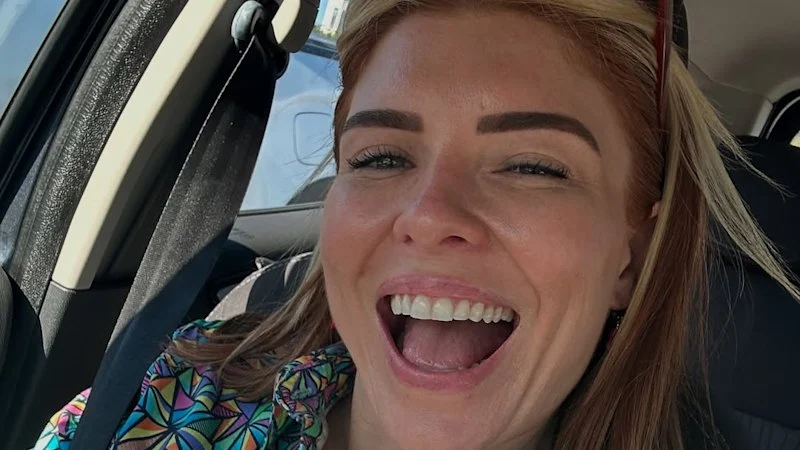“She came back and said, ‘Yes, I think you’ve got combined ADHD’,” Campbell says.
She then visited her GP for a psychiatrist referral and to discuss plans to co-prescribe: “But the doctor didn’t want to give me the referral … until she had a full report of this ADHD assessment [from the psychologist].”

Campbell’s journey to diagnosis was long and expensive.Credit: @sparketcadet
More back and forth ensued until Campbell was able to see a psychiatrist in July, costing $1075 upfront.
After further difficulties with GPs, she found a doctor in Windsor to co-prescribe medication in August.
“I’ve now got that clarity on why I am the way I am for certain things,” she says. “I just needed my brain to have some glasses – that’s literally how I feel.”
Change coming for Queensland residents
Campbell knows of people who have waited up to a year to secure an appointment with a practitioner who can test and prescribe for ADHD.
She also knows that even without lengthy waiting periods, cost can be prohibitive.
Nicholls described the move to allow specialist GPs in Queensland to treat adults with ADHD as a “game changer” that would improve access to services and better utilise GPs’ skillsets.
ADHD affects an estimated 1 million Australians, including more than 530,000 adults.
Loading
Until now, the disorder has been diagnosed by specialists such as psychologists, psychiatrists and paediatricians (for children), usually with a referral from a GP.
Peak bodies, including the Royal Australian and New Zealand College of Psychiatrists, have been broadly supportive of Queensland’s proposal, with the caveat that GPs need specialised training and should continue working with psychiatrists to treat ADHD patients.
Royal Australian College of General Practitioners president Dr Michael Wright agrees with a collaborative approach, but says for that to work, patients need access to higher rebates.
“ADHD care is complicated [and] complex,” Wright says. “We really need to look at increasing the Medicare rebates, particularly for these longer consultations, to allow more case conferencing.”
Wright says most GPs already have the skills, and those who don’t feel confident are given help.
Overdiagnosis and medication misuse
Queensland’s initiative, praised as a win for patients like Campbell, has not been without criticism.
A Brisbane-based GP, who spoke to this masthead on the condition of anonymity owing to the sensitivities associated with treating development disorders, says diagnosing ADHD can be complicated because of its overlap with other conditions.
Loading
These include autism spectrum disorder, depression, anxiety, substance use disorder and sensory processing disorder, with an estimated 65 per cent of people with ADHD also experiencing at least one comorbidity.
The GP says the process to identify ADHD is based on “vague inclusion criteria”, which could lead to a surge in false diagnoses. They also fear the change will trigger a potentially unethical rise in health experts providing diagnosis – and access to drugs – for payment.
“It’s being sold as a cheaper option to come and see a GP, but the market will absolutely adapt, so the GPs will then charge more because it’s a sought-after service,” they say.
“The GP market is already getting smashed – you won’t find any GPs with empty slots at the moment – so you’ll have business models generated where they come out saying they can do it, but it’ll cost more. Then there’s pressure on the GP to then grant the diagnosis.”
Professor Bolanle Ola, a psychiatrist with experience treating and diagnosing ADHD, says the psychiatric community has raised similar concerns about misdiagnosis and overdiagnosis.

Ritalin is the most common medication prescribed to treat and manage ADHD.
“People are also concerned about the short consultation times of GPs, which might foster a quick-fix mentality, potentially leading to overprescribing of stimulants with possible side-effects,” he says.
From 2013 to 2020, the number of Australians diagnosed with ADHD more than doubled, with about 470,000 individuals prescribed medications between in 2022.
Wright says he has not received negative feedback from members since the proposal was announced, and notes that not all GPs will want to treat ADHD patients.
“Things like inserting long-acting contraceptives – some GPs do that more, whereas others feel unfamiliar with it and don’t do it,” he says. “I’m expecting that ADHD prescribing will be similar – not everyone will do it.”
ADHD care moving forward
Campbell continues to see her GP on Brisbane’s northside to manage her medication, and has returned to the psychologist who provided her initial diagnosis under a subsidised mental health plan.
“You go through the five stages of grieving for your past life … [but] I’m coming through the end of it and I can see the light,” she says.
“This is my life now, and it’s awesome.”
Ola says care “should be multidisciplinary and individualised, tailored to the patients”.
“I think patients need to be informed about the scope and the limitations of GP-led ADHD management, and the potential need for specialist involvement,” he says.
With changes due to roll out in just over a week, Wright urges people to check in with their GP about their position on ADHD treatment, and to “not expect too much change” straight away.
Start the day with a summary of the day’s most important and interesting stories, analysis and insights. Sign up for our Morning Edition newsletter.


